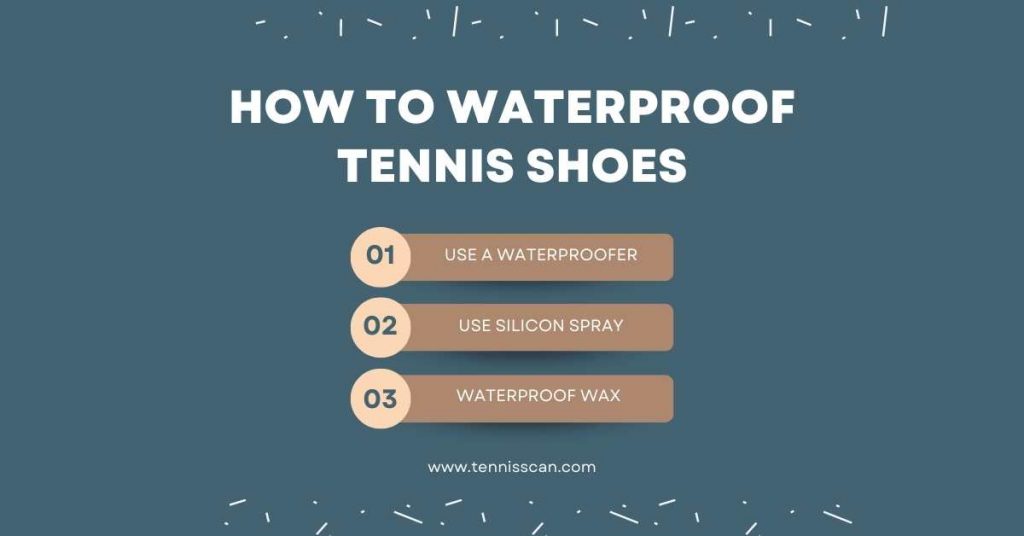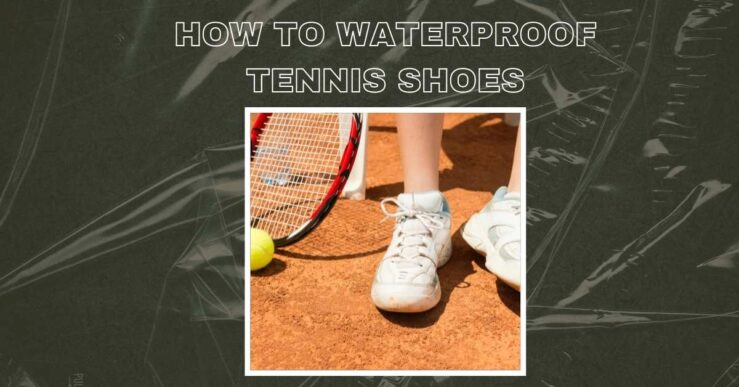At the water park, bouncy sneakers are delightful, but on the tennis court, they’re not so great. Tennis shoes that are wet are not only inconvenient, but they also significantly “dampen” your serving ability. But how do waterproof tennis shoes for your better game?
Fortunately, there are numerous secure methods for waterproofing tennis shoes. You must study our research on waterproofing tennis shoes to avoid playing tennis with wet socks. Tennis shoes are quite simple to waterproof, particularly when you consider their permeable construction.
How To Waterproof Tennis Shoes 2022?
So, if the shoes need to be cleaned, start by giving them a thorough wash. You can move on to the following step if they are clean. But keep in mind that some materials, like suede, can’t get wet, so you might want to stay away from them.
Before waterproofing your shoes, you might want to think about hiring a professional shoe cleaning. Following are a few of the most popular methods for waterproofing tennis shoes:
Related to: Hiking Boots vs. Tennis Shoes
Prepare Your Shoes For Waterproofing
Try your best to clean your shoes before attempting to waterproof them. This indicates that you should brush away any debris that may be caught in the canvas if they have never used mud or other similar techniques.
Things can get dangerous if the tops of your tennis shoes contact mud. You might need to throw them in the laundry for a quick clean if the material permits it. If not, you might need to have them cleaned by a specialist. You can waterproof your shoes after they have been prepared.
Read more: How To Wash Tennis Shoes In Washing Machine?

Use A Waterproofer
Tennis shoes can be waterproofed in the most typical way by using a spray-on waterproofer, which you can get in any shoe store or online. There are many waterproofing sprays available; most of them are scented, but unscented options are also available if you want.
Use Silicon Spray
The second method of waterproofing involves spraying the shoes with silicone. Using a silicone spray has a lot of advantages. First off, there are no special qualifications or knowledge needed, and it is incredibly simple to apply.
It offers a decent waterproofing defense against stains and water. Third, most hardware stores have it, and it is reasonably priced. The fact that it is non-toxic and leaves the shoes with a lovely shine can aid to enhance their appearance.
Clean the shoes before using a silicone spray on them. Then, liberally spray the outside of the shoes with silicone spray, being sure to uniformly coat every surface. Before donning the shoes, give them a few hours to dry.
Contain no allergens:
This is a fantastic approach to guarantee that you obtain waterproofing that won’t bother your skin if you’re sensitive to specific materials.
Not harmful:
Silicone is a neutral substance that is approved for usage without any restrictions. It is safe to use around pets and is not carcinogenic.
Budget-friendly:
A single can, which costs between $10 and $20, can be used to spray down several pairs of shoes.
The appearance of shoes:
Are simple to use and don’t alter the appearance of your shoes. Since silicone sprays are transparent, the color of your shoes is not affected. A silicone spray can be used at any place without creating a mess.
Waterproof Wax
Tennis shoe waterproofing can also be accomplished with wax. This will make the shoes waterproof and provide some additional safety. Most shops that sell shoe accessories have a can of shoe wax for sale.
Make sure to buy an item that has waterproofing capabilities. Shoe wax from the store is a great substitute for beeswax. It works just as well if you can get your hands on some. Make sure your tennis shoes are fresh and dry before applying wax to protect them.
Use a brush or your fingers to put a thin layer of wax on the shoes outside. Make sure to inspect every crevice, paying close attention to the sewing. Allow the shoes to sit for a bit so the wax may set once they have been evenly applied.
The following time you hit the court, your newly waterproofed sneakers will be in perfect condition. Here’s how to use the wax process if you want to give it a try:
Beeswax:
Your ideal wax should be made entirely of beeswax, with no additional ingredients.
Beeswax should be rubbed with your hands:
The beeswax becomes more spreadable as a result of warming up. The simplest approach to speed up the waxing session is to do this.
Spot check:
Some tennis shoes won’t work with beeswax. Doing a spot test on a plain area is recommended first if everything goes according to plan.
Beeswax should be applied to your shoe:
The fabric of the shoes and their pores will be covered by wax. You won’t have to worry about water when your shoes are completely covered because beeswax is water-repellent.
Water Test:
Spray a little water on your shoe with a mister. The water will slip off your shoe if your tennis shoes are properly waxed.
Use Scotchgard
You might not need to purchase any products to waterproof your shoes if you have a lot of furniture in your home or prefer to keep your carpet spotless. Perhaps you already have a can of Scotchgard in your residence.
Tennis shoes can be waterproofed and stain-proofed using Scotchgard, a specialized fabric protector spray produced by 3M. Like using a silicone-based spray, Scotchgard is applied to shoes before being allowed to air dry.
Although it’s simple and inexpensive, many people try to stay away from Scotchgard as a protector.
There is some good news for you if you don’t want to bother with waterproofing your shoes regularly. Tennis shoes are no longer always the wet-weather footwear you may recall from your youth.
Most significant shoe manufacturers now provide waterproof tennis shoes in their selection, including household names like Vans, Nike, and New Balance. These options spare the footwear from chemical treatment.
Instead, waterproofing was considered when choosing the materials and design for the shoe. Tennis shoes that are waterproof may require less upkeep, but they can also cost a lot more money.
If you’re on a tight budget, making your waterproofing will be much more reasonable than buying a pair of waterproof tennis shoes, which can easily cost upwards of $90 (like this pair).
FAQ’S
The ideal way to waterproof tennis shoes depends on how frequently and for what purposes the wearer wears them. For instance, if you work in construction, a silicone spray would be appropriate. On either side, using a waterproofer is the best option if you just sometimes wear tennis shoes in the rain or snow.
It does, indeed! Your shoes’ exterior is comprised of leather or cloth. These are porous by nature, which makes it simple for them to absorb fluids. When you add a waterproofer to the shoe’s exterior, it creates a layer of defense over them, preventing rainwater from quickly penetrating them.
Both the difficulty and frequency of servicing will be manageable. You should only touch up your shoes once every four to six months if you wear them frequently. If you don’t use your shoes often, you might only need a yearly treatment.
Due to its effectiveness, Scotchgard is a favorite among many cleaning specialists. However, normal Scotchgard cannot be completely effective in the presence of a lot of water. Use Scotchgard Heavy Duty Water Shield spray if you are worried about its effectiveness.
If you don’t see any water being soaked by the shoes, they are waterproof. The extra moisture ought to drain from the shoes. Any water that contacts your shoes when you are walking through a puddle should immediately roll off of them. Your tennis shoes are not waterproof if they are made of PVC.
